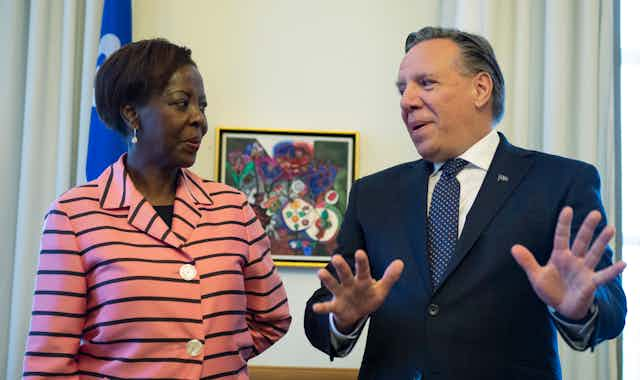Fifty years ago, on March 20, 1970, the representatives of 22 countries met in Niamey, Niger, to form the Agence de coopération culturelle et technique, an international body dedicated to dialogue among French-speaking nations. The agency’s goals and structures shifted over time until in 2005 it became the present-day Organisation internationale de la Francophonie.
March 20 marks Francophonie Day and March itself is le mois de la Francophonie. But these opportunities to celebrate a shared language and cultural dialogue come with baggage.
Some observers see in La Francophonie a form of neocolonialism that has helped to protect France’s international influence and promoted metropolitan French culture at the expense of local inflections. Even in North America, France is active in supporting Francophonie events; Québec, too, has used language to assert political influence beyond its borders since the 1970s.

The Francophonie may have a mixed legacy but there is no need to reject its principles wholesale. By looking at grassroots efforts led by determined individuals — in Vermont, no less — we can de-emphasize the France-centric qualities of the Francophonie. That way, we might foster good will and dialogue in an increasingly bordered world.
Immigration and ‘bonne entente’, or good will
In eastern North America, French has thoroughly transcended political boundaries. After 1840, French Canadians emigrated from Lower Canada (later Québec) to the United States in ever-rising numbers — likely more than a million over the course of a century. In the northeast, they built distinct cultural institutions that would ensure the permanence of their ethnic identity.

Enter Joseph Denonville Bachand who, in 1902, crossed the Canada-U.S. border and established his dental practice in St. Johnsbury, Vt. Bachand supported French-language endeavours in his state and continually reached back to Québec. Far from confining his interests to ethnic organizations, he launched a campaign for a state senate seat. He ultimately lost the primary in a crowded field.
Still, Bachand’s moment came. In 1937, he obtained his long-desired sinecure when Governor George Aiken appointed him chairman of the Vermont Commission of Foreign and Domestic Commerce. Bachand became the lead architect of a good will ceremony whose likes had been few in the history of Canada-U.S. relations.
On June 12, 1938, public officials from both countries gathered in the rural hamlet of Stanhope, Que., located in sight of the international border. There they dedicated the Monument de la Bonne Entente (Good Will Monument), a stone marker that cemented renewed dialogue and friendship between Québec and Vermont. Bachand and Aiken were present alongside Québec dignitaries. The Vermont delegates in particular noted the importance of cultivating shared commercial interests.

Connecting through culture
I presume that Bachand, who called himself the pioneer of French cultural survival in Vermont, saw the event differently. He lived out the belief that immigrants could fulfill their civic obligations and contribute to their adoptive country while retaining their heritage. Anglo-Vermonters did not meet that proposition with perfect equanimity: many demanded an Americanism that erased minority cultures. French Vermonters remained in something of a political and social wilderness — as Bachand himself had been.
He hoped to change that. His excursions to Québec and his work on the good-will ceremony of 1938 suggested that a stronger international relationship, growing from shared cultural anchors, might ensure the recognition and acceptance of French Vermonters.

The event at the border did not occur in a vacuum. Representatives from Québec and Vermont had begun to meet on an annual basis. Continentalist sentiments were growing in intellectual circles on both sides of the boundary line. But, in Québec and Vermont, there was reason to believe that a shared idiom could yield benefits that would transcend economics.
Despite the dedication of the Monument de la Bonne Entente, those efforts were overtaken by larger, more urgent concerns, namely the Second World War. Yet, when Nazi Germany launched its invasion of Poland the following year, Vermont Governor Aiken was again north of the border in Canada with his “Québec lieutenant.” Though continental integration continued slowly during the Second World War, smaller efforts were overshadowed by the conflict.
Towards a new Francophonie
Bachand’s cultural vision was left incomplete as he retired from public life in 1959. He died in March 1970, three days before the creation of the Agence de coopération culturelle et technique, and a few years before a revival of ethnic affirmation in Franco-American communities. He was already a forgotten figure.
Since then, new pioneers have used the French language to build bridges across borders in all of their forms. Québec’s sovereignty movement inspired some Franco-Americans to act locally for the preservation of their own heritage. More recently, some have reached out to African immigrants in Maine and welcomed them in their own tongue. Three years ago, Burlington, Vt., hosted Québec officials at an event that seamlessly blended commerce and culture.
At that event, Vermont Attorney General T. J. Donovan reminded attendees that the historic marginalization of Franco-Americans has reappeared, now with other minority groups as targets. The winds of nativism are again sweeping around the globe, a dark reminder of the pre-war wall-building that Bachand witnessed.
The francophone world now has an opportunity to find renewed purpose and to break with difficult questions about neocolonialism and cultural homogenization. From a social wilderness and the supposed margins of the francophone world, Bachand’s work points to the value of individual agency and relentless dedication to bridging borders.
Language and language education are powerful pathways to mutual understanding, to bonne entente; people can and should reclaim that power, whatever their preferred tongue. Now, more than at any time since the 1940s, there must be dialogue between people of good will to complement and mould the concerns of state power.


